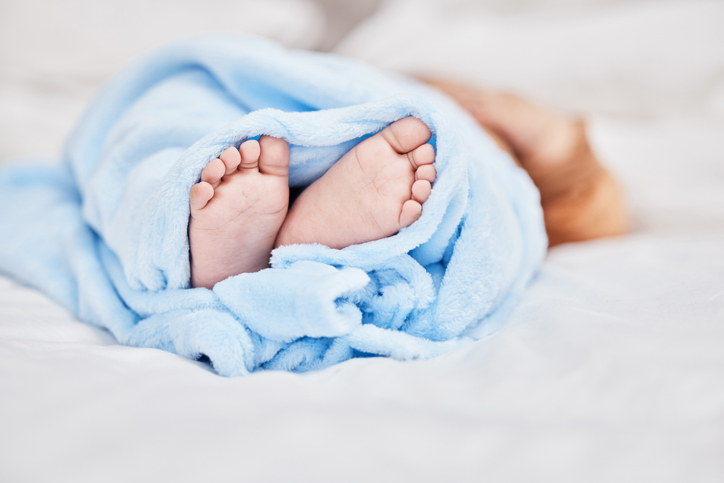Bouncing up and down on a ball. Playing heavy metal music. Sleeping in the bedroom doorway. These are some of the desperate lengths parents resort to in order to get their children to sleep at bedtime. It sounds mad. Yet none of this will come as a surprise to parents with young children. My own four-year-old only drifts off to sleep if we both become cats for the final few minutes of bedtime. I am then obliged to say good night to him in ‘cat’: ‘Miaow, miaow-miaow’ – in case you were wondering. Still, once this is done, he does then fall asleep on his own, in his own bed, and only wakes in the night if he has a nightmare or is ill.
Sleep training is the final taboo for parents
I must be one of the lucky ones, because a survey of 3,000 mums and dads, carried out by Survation for CBeebies Parenting, suggests that 40 per cent of parents are ‘sleep starved’, getting by on just three to five hours of sleep a night. Two-thirds said their child’s sleep pattern disrupted their own sleep.
The most glaring finding was that less than 40 per cent of parents followed a consistent bedtime routine. But we shouldn’t really be surprised, because in the UK practical baby-care advice is not readily provided to expectant parents. I do not remember at any point in either of my pregnancies anyone mentioning the importance of routine for babies.
During my first pregnancy, my husband and I joined a National Childbirth Trust (NCT) course to help us prepare. All I can recall is a traumatically graphic description of a caesarean and my introduction to the term ‘skin-on-skin’. Everyone was very excited about this, but two babies later, I still think it is massively overrated; as long as you can hold your baby, who cares what you are, or aren’t, wearing?
The importance of routine, however, I discovered much later, around five months into being a new mother. It was a winter’s evening, it was snowing, and despite being massively sleep-deprived, I was outside trudging through the slushy streets. Why? Because pushing my baby in his pram was the only way he would sleep. Thanks to a supportive phone call from another mum, and her recommendation of an app that focused on daily routines, I finally began to understand why my son refused to go to bed before midnight: if you let a baby take a three-hour nap until 5 p.m., he will not be tired for bedtime at 7 p.m.
So transformational was this app’s month-by-month daily schedules, complete with naptimes, feeding suggestions and ‘wake windows’ (the amount of time a baby should stay awake between naps), that when I had my second baby, while still in the labour ward and less than 24 hours after giving birth, I was Googling: ‘How soon can you get a newborn baby onto a routine?’
It seems obvious now, but in the newborn trenches it’s hard to work such things out on your own; you need to be given this information. Understandably, midwives focus on the health of your pregnancy and prepare you for childbirth. But would it be so out of the question to expect a few baby-care pointers, like how many naps a day your baby should be doing in the first few months?
Sleep training is the final taboo for parents, but after doing my research, I concluded that the controlled crying method was not harmful, and would most likely be beneficial to all of us. So, when my son was six months old, we tried it out. It was not a fun week, but it was successful. From then on, bar a few occasions, he fell asleep independently and slept through the night. It was a revelation.
Keen to share my triumph with my fellow mums, I put something in my NCT WhatsApp group. Despite our collective obsession with baby sleep being a daily topic of discussion, my message was met with radio silence. Later, one of the dads in the group privately messaged my husband to ask him how he had convinced me to try out sleep training.
The NCT website dares to broach the subject, but makes it clear it is not enthusiastic about the idea:
‘The research on sleep training in the first six months of life is contradictory. One review suggested it can work for most young children but a more recent review found that sleep training does not improve outcomes for mums or babies.’
This seems misleading. New parents are much better advised to consult economist and parenting author Emily Oster. In her book, Cribsheet, she provides detail on the significant amount of data on sleep training studies available, allowing parents to make their own informed choices.
While I’m not trying to push sleep training onto anyone, I do think it strange that the very idea of teaching your child to sleep independently has become so controversial. We expect parents to teach their children how to eat with cutlery and how to dress themselves, yet the idea that we might also impart this essential skill of independent sleep is treated very differently. Perhaps parents would fare better – and sleep more – if we began having honest conversations about the practical side of caring for a baby before a mewling newborn is placed into the arms of its bewildered new mother.







Comments